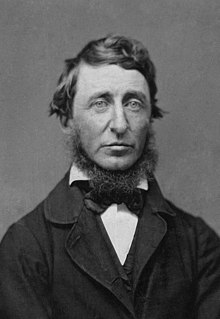
Back Henry David Thoreau Afrikaans هنري ديفد ثورو Arabic هنرى دافيد ثورو ARZ Henry David Thoreau AST Henry Thoreau AVK Henri Devid Toro Azerbaijani Генры Дэйвід Тора Byelorussian Хенри Дейвид Торо Bulgarian হেনরি ডেভিড থরো Bengali/Bangla Henry David Thoreau Breton
Henry David Thoreau | |
|---|---|
 Thoreau in 1856 | |
| Born | David Henry Thoreau July 12, 1817 Concord, Massachusetts, U.S. |
| Died | May 6, 1862 (aged 44) Concord, Massachusetts, U.S. |
| Alma mater | Harvard College |
| Era | 19th-century philosophy |
| Region | Western philosophy |
| School | Transcendentalism[1] |
Main interests |
|
Notable ideas | |
| Signature | |
| This article is part of a series on |
| Libertarianism in the United States |
|---|
 |
| This article is part of a series on |
| Anarchism in the United States |
|---|
 |
Henry David Thoreau (July 12, 1817 – May 6, 1862) was an American naturalist, essayist, poet, and philosopher.[2] A leading transcendentalist,[3] he is best known for his book Walden, a reflection upon simple living in natural surroundings, and his essay "Civil Disobedience" (originally published as "Resistance to Civil Government"), an argument in favor of citizen disobedience against an unjust state.
Thoreau's books, articles, essays, journals, and poetry amount to more than 20 volumes. Among his lasting contributions are his writings on natural history and philosophy, in which he anticipated the methods and findings of ecology and environmental history, two sources of modern-day environmentalism. His literary style interweaves close observation of nature, personal experience, pointed rhetoric, symbolic meanings, and historical lore, while displaying a poetic sensibility, philosophical austerity, and attention to practical detail.[4] He was also deeply interested in the idea of survival in the face of hostile elements, historical change, and natural decay; at the same time he advocated abandoning waste and illusion in order to discover life's true essential needs.[4]
Thoreau was a lifelong abolitionist, delivering lectures that attacked the fugitive slave law while praising the writings of Wendell Phillips and defending the abolitionist John Brown. Thoreau's philosophy of civil disobedience later influenced the political thoughts and actions of notable figures such as Leo Tolstoy, Mahatma Gandhi, and Martin Luther King Jr.[5]
Thoreau is sometimes referred to retrospectively as an anarchist,[6][7] but may perhaps be more properly regarded as a proto-anarchist. In his seminal essay, "Civil Disobedience", Thoreau wrote as follows:
"I heartily accept the motto,—'That government is best which governs least;' and I should like to see it acted up to more rapidly and systematically. Carried out, it finally amounts to this, which also I believe,—'That government is best which governs not at all;' and when men are prepared for it, that will be the kind of government which they will have.... But, to speak practically and as a citizen, unlike those who call themselves no-government men, I ask for, not at once no government, but at once a better government."[8]
- ^ Cite error: The named reference
:6was invoked but never defined (see the help page). - ^ "Henry David Thoreau | Biography & Works". Encyclopædia Britannica. Archived from the original on March 16, 2019. Retrieved July 8, 2019.
- ^ Howe, Daniel Walker, What Hath God Wrought: The Transformation of America, 1815–1848. ISBN 978-0-19-507894-7, p. 623.
- ^ a b Thoreau, Henry David. A Week on the Concord and Merrimack Rivers / Walden / The Maine Woods / Cape Cod. Library of America. ISBN 0-940450-27-5.
- ^ Cite error: The named reference
:2was invoked but never defined (see the help page). - ^ Seligman, Edwin Robert Anderson; Johnson, Alvin Saunders, eds. (1937). Encyclopaedia of the Social Sciences, p. 12.
- ^ Gross, David, ed. The Price of Freedom: Political Philosophy from Thoreau's Journals. p. 8. ISBN 978-1-4348-0552-2. "The Thoreau of these journals distrusted doctrine, and, though it is accurate I think to call him an anarchist, he was by no means doctrinaire in this either."
- ^ Thoreau, Henry David. "On the Duty of Civil Disobedience, 1849, original title: Resistance to Civil Government". The Project Gutenberg. Retrieved May 20, 2023.